Related Research Articles
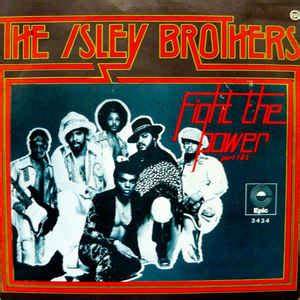
"Fight the Power" is a song recorded by the Isley Brothers, who released the song as the first single off their landmark album, The Heat Is On. The song is notable for the usage of the word bullshit, which was censored during radio airplay.

"Controversy" is a song by American musician Prince, the lead single and title track to his 1981 album. The song addresses speculation about Prince at the time such as his sexuality, gender, religion, and racial background, and how he could not understand the curiosity surrounding him.

"I'll Take You There" is a song written by Al Bell, and originally performed by soul/gospel family band the Staple Singers. The Staple Singers version, produced by Bell, was released on Stax Records in February 1972, and spent a total of 15 weeks on the charts and reached #1 on the Billboard Hot 100. It is ranked as the 19th biggest American hit of 1972.

"Go Away Little Girl" is a popular song written by Gerry Goffin and Carole King. It was first recorded by Bobby Vee for Liberty Records on March 28, 1962. The lyrics consist of a young man asking a young attractive woman to stay away from him, so that he will not be tempted to betray his steady girlfriend by kissing her. The song is notable for making the American Top 20 three times: for Steve Lawrence in 1963, for The Happenings in 1966, and for Donny Osmond in 1971. It is also the first song, and one of only nine, to reach US number 1 by two different artists.
"The Blues" is the title of a number-one R&B single by the band Tony! Toni! Toné!. The hit song spent one week at number one on the U.S. R&B singles chart and peaked at number 46 on the Billboard Hot 100. The single also peaked at number 43 on the Hot Dance Club Play Chart, and number 92 on the UK Singles Chart
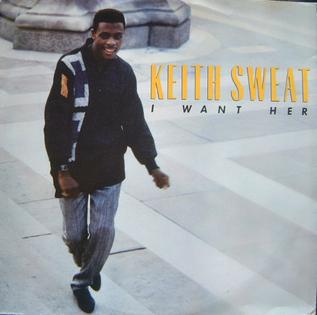
"I Want Her" is a song by American R&B singer Keith Sweat. As the first single from his debut album, Make It Last Forever, it reached number five on the Billboard Hot 100 and number one on the Hot R&B/Hip-Hop Singles & Tracks chart for three weeks. and became the most successful number one single of 1988 on the Billboard Hot R&B chart. "I Want Her" also peaked at number 38 on the dance chart. The song topped the R&B Billboard Year-End chart for 1988. It was ranked number 6 on complex.com's list of 25 best new jack swing songs of all time.

"Take Your Time " is the debut single by the S.O.S. Band. It was released on March 18, 1980 as the lead single from the debut album S.O.S. through Tabu Records, three months before the album's release.

"I'll Be Good to You" is a 1976 hit song by R&B duo the Brothers Johnson. George Johnson, one of the two Johnson brothers in the band, wrote the song after deciding to commit to a relationship with one woman, instead of dating several at a time. While George was recording a demo for the song, family friend Senora Sam came by and added some lyrics. Brothers Johnson producer and mentor Quincy Jones heard the song, liked it, and convinced George to sing lead on the finished track. Released from their debut album, Look Out for #1, it was a top-ten hit on the Billboard Hot Singles Charts, peaking at number three, and a number one song on the Billboard R&B Charts during the summer of 1976. The single was later certified gold by the RIAA.

"Heaven Must Be Missing an Angel" is a disco song written by Freddie Perren and Keni St. Lewis. It was recorded by the American band Tavares in 1976. It was released as the first single from their fourth album, Sky High! (1976), and was split into two parts: the first part was 3 minutes and 28 seconds in length, while the second part was 3 minutes and 10 seconds. "Heaven Must Be Missing an Angel" was re-released in February 1986.

"The Second Time Around" is a 1979 hit by Los Angeles-based group Shalamar. The song is the first single from their album, Big Fun. Released in August 1979, the single went to number one on the soul chart and was their most successful hit on the Hot 100 pop chart, reaching number eight in early 1980. "The Second Time Around" also went to number one on the disco/dance chart in January 1980. The song was produced by Leon Sylvers III, who cowrote the song with William Shelby.
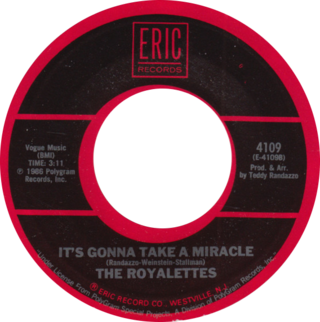
"It's Gonna Take a Miracle" is a popular song written by Teddy Randazzo, Bobby Weinstein, and Lou Stallman. It was first an R&B hit in 1965 for The Royalettes, which reached the Top 30 on the U.S. R&B chart and peaked at number 41 on the Billboard Hot 100 and number 37 on Cash Box.
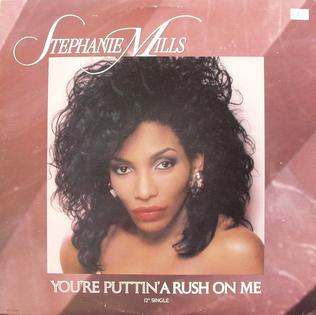
"(You're Puttin') A Rush on Me" is a 1987 single by American singer Stephanie Mills. The single was her third number one on the Hot Black Singles chart and second number one in 1987. The single spent one week at the top spot and crossed over to the Billboard Hot 100, peaking at number eighty-five. "(You're Puttin') A Rush on Me" also peaked at number twenty-three on the dance charts.
"Inside Love " is a song written by Kashif, and performed by American R&B singer George Benson.
"I Wonder" is a 1944 song written and originally performed by Pvt. Cecil Gant. The original version was released on the Bronze label, before Gant re-recorded it for the Gilt-Edge label in Los Angeles. The record made it to number one on the Juke Box Race Records chart and was Pvt. Gant's most successful release. In February 1945, pianist, Roosevelt Sykes hit number one with his version of the song. Roosevelt Sykes version is notable in that it replaced Pvt. Gant's version, at number one on the Juke Box Race Records chart.
"Funny How Time Slips Away" is a song written by Willie Nelson and first recorded by country singer Billy Walker. Walker's version was issued as single by Columbia Records in June 1961 and peaked at number 23 on the Hot C&W Sides chart.

"When You Talk About Love" is a song recorded by American singer and actress Patti LaBelle. It was written by Ann Nesby, James Harris III, Terry Lewis, and James "Big Jim" Wright for her thirteenth studio album, Flame (1997). Production was helmed by Harris and Lewis, with Wright credited as co-producer. Released as the album's lead single, it became one of the LaBelle's most popular hit singles in the 1990s, reaching number 56 on the US Billboard Hot 100 and number 12 on the Billboard Hot R&B/Hip-Hop Songs chart. A dance remix of the song helped to bring the song to number-one on the Billboard Hot Dance Club Songs chart, making it the fourth number-one dance single in LaBelle's career. The music video featured LaBelle playing a teacher giving a "class" about love.

"You're My Driving Wheel" is a dance/disco song by The Supremes. The song was released on September 30, 1976 as the first single from their album Mary, Scherrie & Susaye. Along with the tracks, "Let Yourself Go" and "Love I Never Knew", "You're My Driving Wheel" peaked at number five on the disco chart. On the Soul chart, the single peaked at number fifty and number eighty-five on the Hot 100.
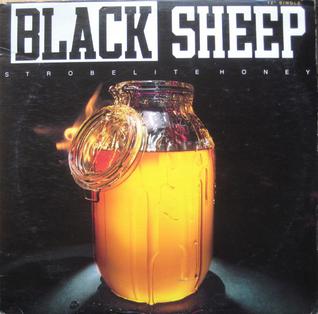
"Strobelite Honey" is a 1991 single by hip-hop duo, Black Sheep. The single was written by William McLean and Dres (rapper), and was the duo's third release from their A Wolf in Sheep's Clothing album. "Stobelight Honey" was the duo's second entry on the US R&B chart, where it went peaked at #36 on the R&B sales chart and #80 on the Hot 100. The single did better on the US dance chart, where it spent one week at number one. The single sampled a pair of songs, both released in 1980: "I Like What You Do To Me" by Young & Company and "Take Your Time " by the SOS Band.
"Who Is He?" is a track from Bill Withers' 1972 album, Still Bill. The music was written by Withers along with Stan McKenny, who wrote the lyrics. The song has also been featured on the soundtrack of Quentin Tarantino's Jackie Brown.
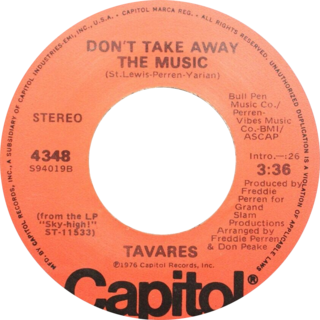
"Don't Take Away the Music" is a hit song by R&B/disco group Tavares, released in the fall of 1976. It peaked at number 34 on the US Billboard Hot 100 singles chart and at number four in the UK. Along with the track "Heaven Must Be Missing an Angel", the song spent two weeks at number 1 on the Hot Dance Club Play chart.
References
- ↑ Whitburn, Joel (2004). Hot Dance/Disco: 1974-2003. Record Research. p. 262.
- ↑ Whitburn, Joel (2004). Top R&B/Hip-Hop Singles: 1942-2004. Record Research. p. 586.